Best CRM for Retail Businesses in 2025
A CRM for retail keeps track of who your customers are, what they’re buying, and how to keep them coming back. It makes it way easier to stay organized, run smarter promos, and turn one-time shoppers into loyal fans. Having a solid CRM isn't optional, it's the difference between guessing and growing.

You’ve got customers coming in, orders stacking up, and your team is scrambling to keep track of who bought what and when. It’s time for an upgrade. The right CRM for retail stores can completely transform how you manage customer relationships, track sales, and boost your business. It goes beyond storing contact info — a great CRM turns customer data into actionable insights that help you make smarter decisions and scale your store.
Some CRMs are perfect for small businesses, others are built for larger teams. No matter your setup, there’s a CRM retail system designed to help you streamline operations, enhance customer experiences, and keep everything running smoothly.
Best CRM for Retail Businesses in 2025
⭐ monday CRM: Best for visual sales pipelines
⭐ Salesforce: Best for enterprise customer management
⭐ ClickUp: Best for all-in-one CRM and project management
⭐ Zoho CRM: Best for customizable workflows for SMBs
⭐ Pipedrive: Best for sales-focused retail teams
⭐ HubSpot CRM: Best for automating customer outreach
Quick Comparison
| CRM | Standout Feature | Best For | Integrates With | Subscription Pricing? | Free Plan Available? |
| monday CRM | Visual sales pipelines | Retail teams | Google Drive, Slack, Zapier, Microsoft Teams | ✅ | ❌ |
| Salesforce | Enterprise-level customer management | Large-scale retail businesses | Shopify, QuickBooks, Mailchimp, Microsoft Outlook | ✅ | ❌ |
| ClickUp | All-in-one CRM and project management | Teams needing multi-functional tools | Slack, Google Drive, Zoom, Trello | ✅ | ✅ |
| Zoho CRM | Highly customizable workflows | Small to mid-sized retail businesses | Google Workspace, Mailchimp, Zapier | ✅ | ✅ |
| Pipedrive | Sales-focused CRM with easy lead tracking | Retail sales teams | Google Workspace, Mailchimp, Zapier, Slack | ✅ | ❌ |
| HubSpot CRM | Automates customer outreach and relationships | Retail businesses focusing on growth | Gmail, Google Drive, Slack, Microsoft Office | ✅ | ✅ |
Our Top Picks
There are tons of CRM for retail options out there, but not all of them are built with retail in mind. We narrowed it down to the ones that actually help you do the work — track customers, boost sales, and keep things running smoothly without the clunky extras. From customizable pipelines to automated follow-ups, these tools were made to support real retail workflows, not slow them down.

monday CRM: Best for visual sales pipelines
 Sync emails to track client interactions
Sync emails to track client interactions  Import leads with integrations
Import leads with integrations monday CRM takes everything people love about monday.com’s project management and applies it to sales and customer tracking. It’s built for teams who want a visual, flexible way to manage their pipeline — no complex setup required. With color-coded boards, automation, and retail-friendly templates, it makes tracking leads and managing customer relationships feel a lot less chaotic.
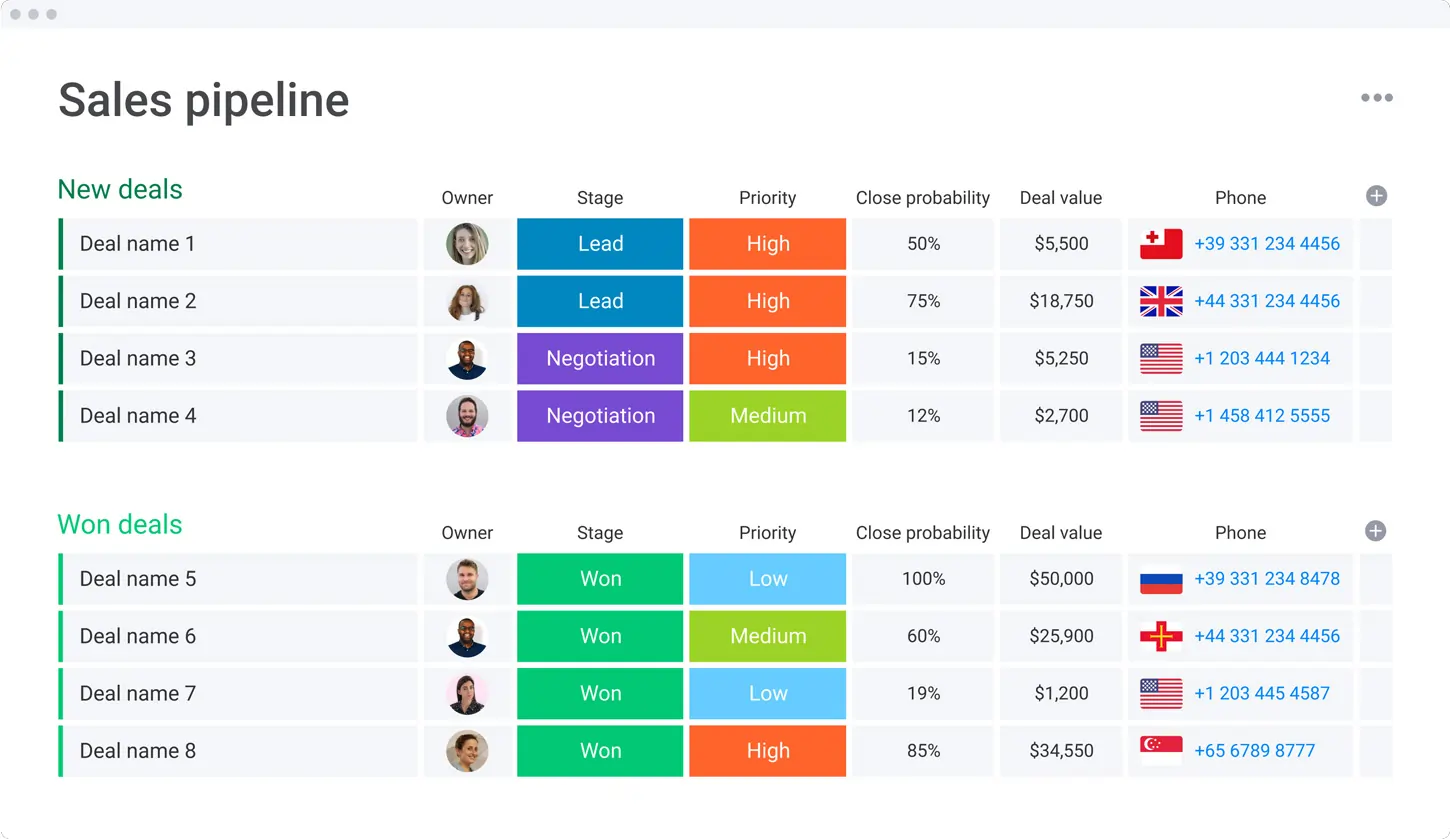 Key Features
Key Features
- Visual pipelines – Track leads and deals in customizable board views with drag-and-drop stages.
- Retail-ready templates – Prebuilt workflows for managing customers, sales, and support.
- Automations – Set rules to handle follow-ups, status changes, and reminders automatically.
- Custom dashboards – Build visual reports to track performance, revenue, and conversion rates.
- Integrations – Connects with tools like Slack, Gmail, Outlook, Shopify, and more.
- Mobile access – Manage your pipeline on the go with a clean, intuitive mobile app.
Pros and Cons
Pros
- Easy-to-use, visual interface
- Quick setup with ready-to-use templates
- Flexible customizations for retail workflows
- Great automation options
- Solid integration library
Cons
- Lacks some advanced CRM features (like built-in calling or quoting)
- Free plan not available for CRM-specific features
- Can get pricey as your team grows
Who It’s For
monday CRM is a great fit for retail teams that want a clean, visual way to manage customers and sales without overcomplicating things. If your team values flexibility, speed, and a no-fuss interface, monday.com makes it easy to stay on top of your pipeline and keep your operations moving.
Salesforce: Best for enterprise customer management
 Track contacts & manage sales pipeline
Track contacts & manage sales pipeline  Get a complete view of every customer
Get a complete view of every customer Salesforce is the heavyweight of the CRM world — and for good reason. It’s built for large-scale operations and offers just about every feature you could imagine, from lead management to AI-powered analytics. For retail businesses with multiple locations, high-volume sales, or complex customer journeys, Salesforce delivers the kind of power and customization that can scale with you.
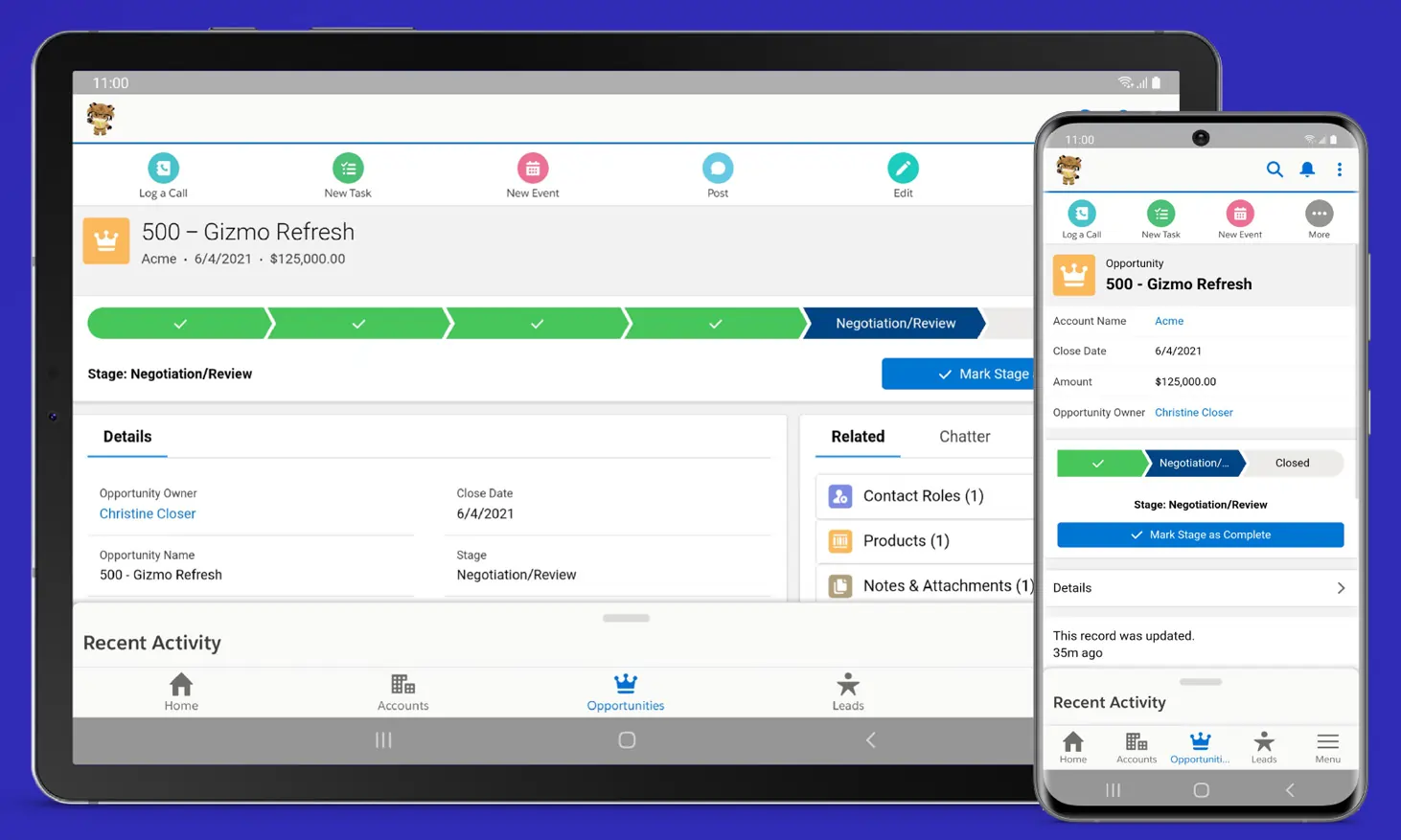
Key Features
- Customer 360 – Get a complete view of each customer across sales, service, marketing, and commerce.
- AI-powered insights – Use predictive analytics and automation to forecast sales and personalize engagement.
- Retail-specific tools – Built-in solutions for loyalty programs, promotions, inventory, and order management.
- Highly customizable dashboards – Tailor your workspace with real-time reporting and performance tracking.
- AppExchange integrations – Access thousands of add-ons and integrations for tools like Shopify, Mailchimp, and more.
- Multi-store support – Manage customer data across multiple retail locations from one platform.
Pros and Cons
Pros
- Extremely customizable and scalable
- Advanced reporting and analytics tools
- Strong support for multi-location retail
- Extensive integration ecosystem
- Built-in AI features for smarter insights
Cons
- Steep learning curve, especially for small teams
- Setup and customization can be time-consuming
- Higher cost compared to other CRMs
Who It’s For
Salesforce is built for larger retail businesses that need deep customization, multi-store support, and powerful data tools. If you’re running complex operations and want a CRM that can handle everything from loyalty programs to advanced sales forecasting, Salesforce is up for the job — as long as you’re ready for the setup.

ClickUp: Best for all-in-one CRM and project management


ClickUp isn’t a traditional CRM, but it’s flexible enough to build one that works exactly how you want. For retail teams that want sales tracking, customer management, task workflows, and team collaboration all in the same space, ClickUp delivers. It’s especially handy if you want to manage both your customers and your internal operations without bouncing between tools.
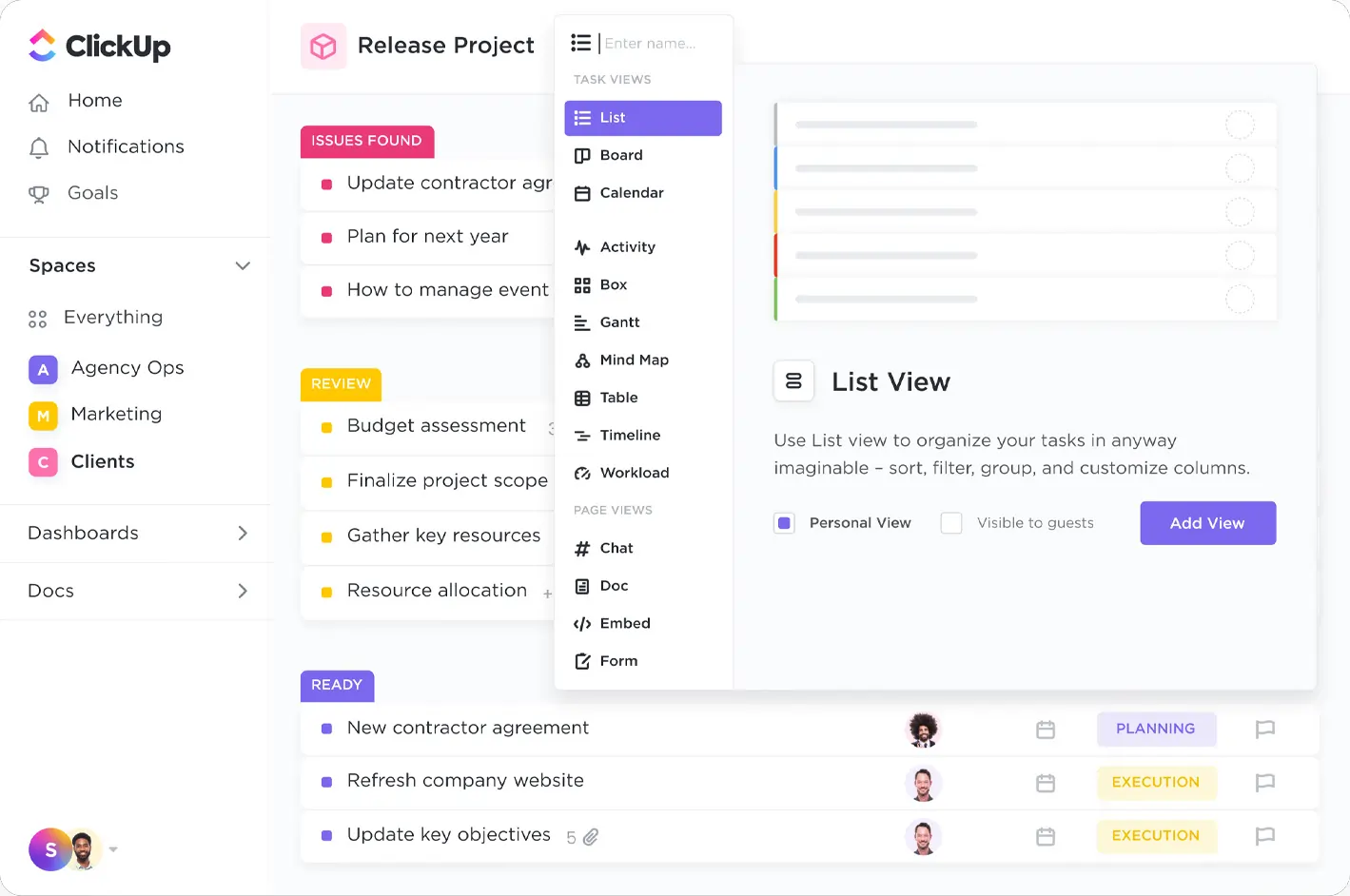
Key Features
- Customizable CRM views – Create list, board, or calendar views tailored to your retail workflow.
- ClickApps – Add modular features like custom fields, automation, and time tracking to build your own CRM setup.
- Task + customer management in one – Track orders, customer details, and internal tasks side by side.
- Automation – Set rules for follow-ups, status changes, and task assignments to save time.
- Docs, chat, and forms built in – Keep communication, SOPs, and customer inquiries all in one place.
- Integrations – Works with tools like Slack, Google Workspace, Shopify, and more.
Pros and Cons
Pros
- Highly customizable to fit any retail workflow
- Combines CRM, task management, and communication tools
- Free plan is generous for small teams
- Great for managing internal ops alongside sales
- Built-in docs, forms, and dashboards
Cons
- Setup can be time-consuming without a template
- Lacks some out-of-the-box CRM features (like native calling and email marketing)
- Can feel overwhelming if too many features activated
Who It’s For
ClickUp is great for retail teams that want flexibility and control. If you’re looking for a customizable CRM that also handles tasks, internal projects, and team communication — all in one place — ClickUp is a solid choice. It’s especially ideal for growing teams that don’t want to juggle multiple tools.

Zoho CRM: Best for SMBs


Zoho CRM gives small and mid-sized retail businesses access to tools you’d usually expect from higher-end platforms — without the price tag. It’s flexible, easy to tailor to your process, and integrates well with the rest of the Zoho ecosystem. For teams that want to streamline sales, automate follow-ups, and build lasting customer relationships, Zoho CRM covers a lot of ground.
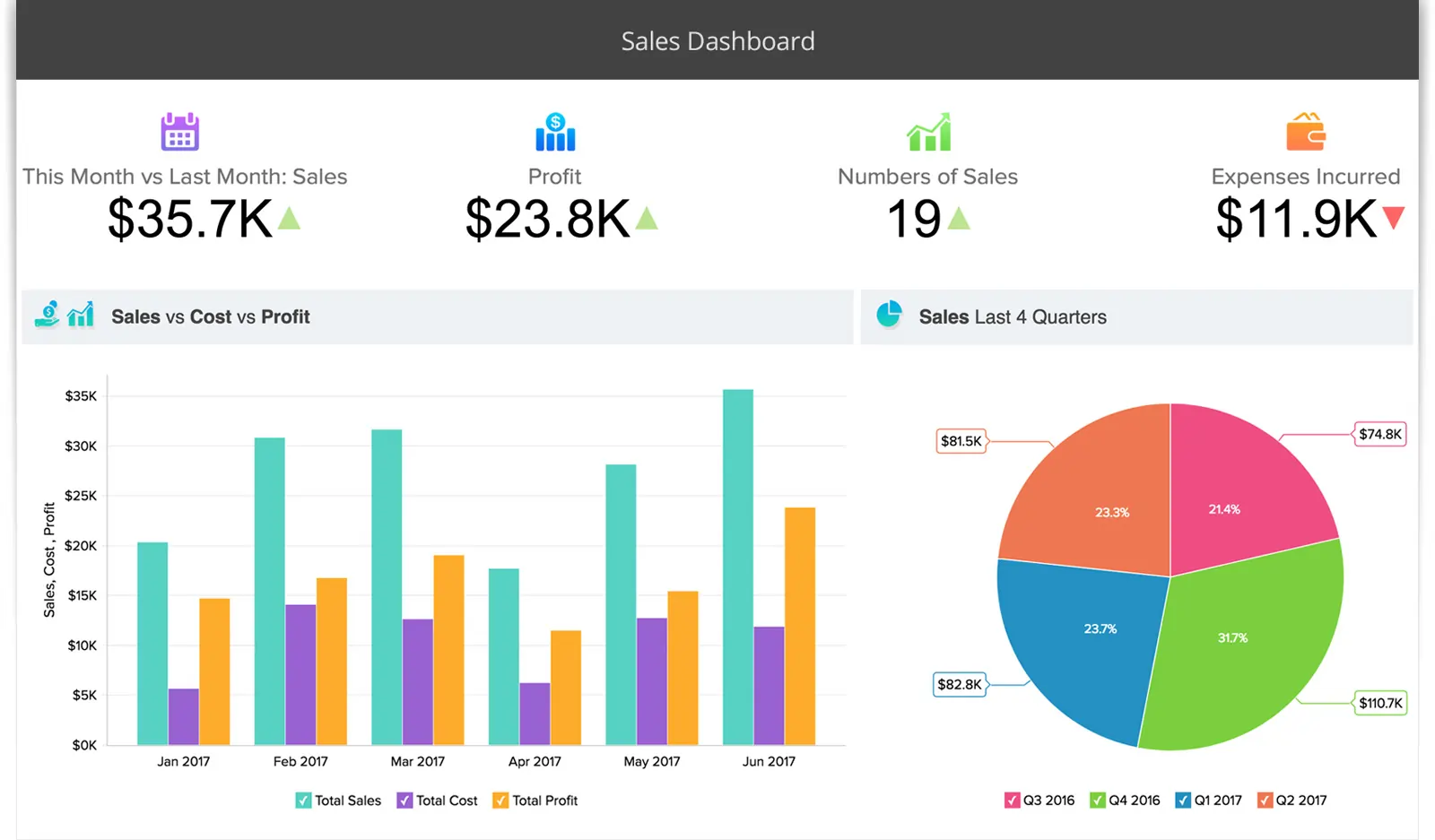
Key Features
- Custom workflows – Automate follow-ups, lead assignments, and sales processes without extra tools.
- Retail automation – Set up triggers based on customer actions, purchase history, or store activity.
- Multichannel communication – Engage customers via email, phone, live chat, and social media — all from one dashboard.
- Sales analytics – Visualize your pipeline, spot trends, and make smarter sales decisions.
- Zoho ecosystem integrations – Seamlessly connects with Zoho Books, Zoho Inventory, and other Zoho apps.
- Third-party integrations – Also works with apps like Google Workspace, Mailchimp, and Shopify.
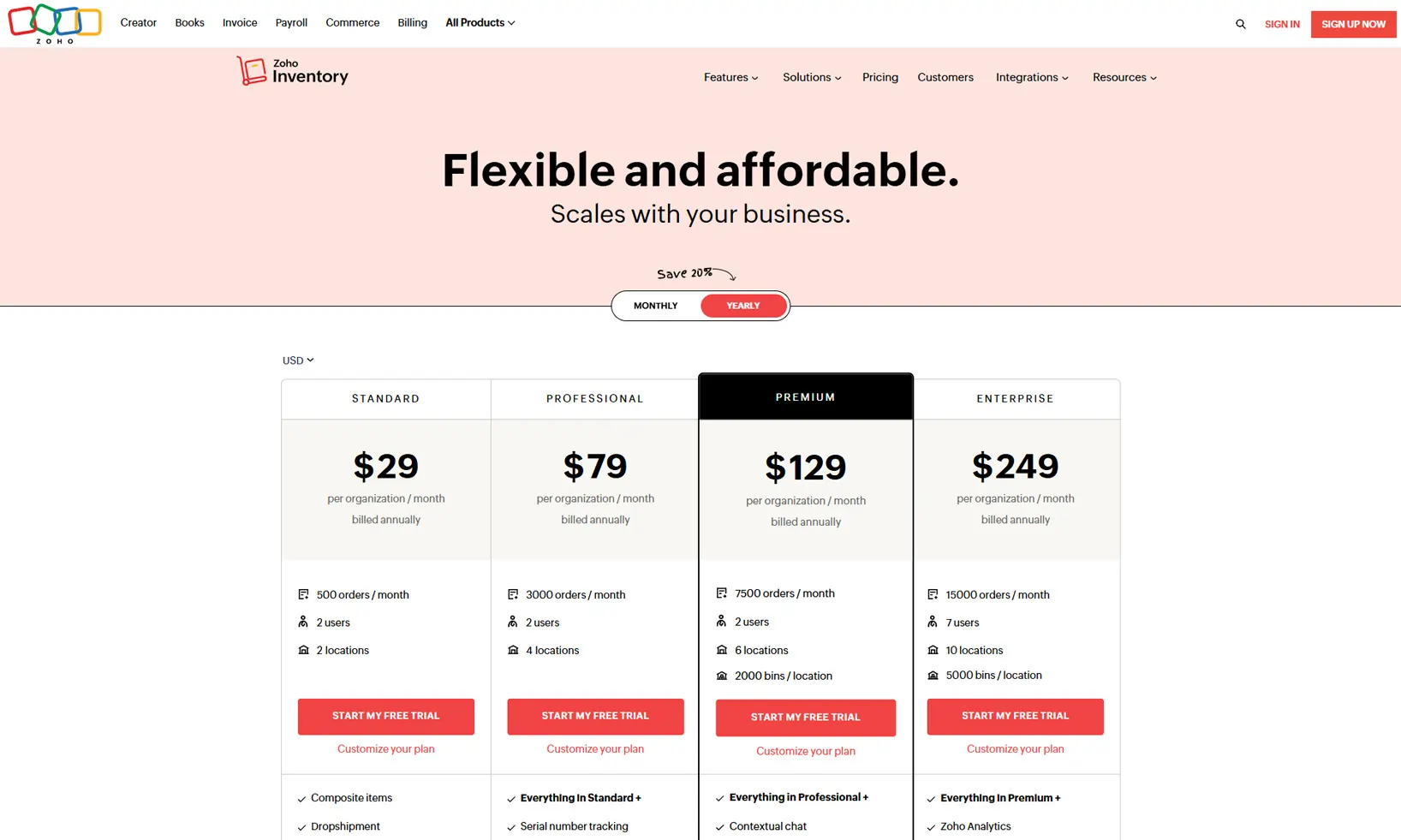
Pros and Cons
Pros
- Very affordable for small to mid-sized retail teams
- Flexible automation and workflow setup
- Multichannel customer communication built-in
- Great native integrations within the Zoho suite
- Strong analytics and reporting tools
Cons
- Interface isn’t as modern or intuitive as others
- Learning curve with advanced features
- Add-ons may be needed for full functionality outside the Zoho ecosystem
Who It’s For
Zoho CRM is a smart pick for small to mid-sized retail businesses that want flexibility without complexity. If you’re looking for solid automation, multichannel outreach, and tight integration with other tools — especially within the Zoho suite — this one gives you a lot of value without breaking your budget.
Pipedrive: Best for sales-focused retail teams


Pipedrive is a CRM built with sales in mind — clean interface, easy pipeline management, and no extra fluff. It’s a great fit for retail businesses with sales teams that need to track leads, manage customer interactions, and close deals without getting bogged down in complexity. Simple, focused, and designed to move deals forward.
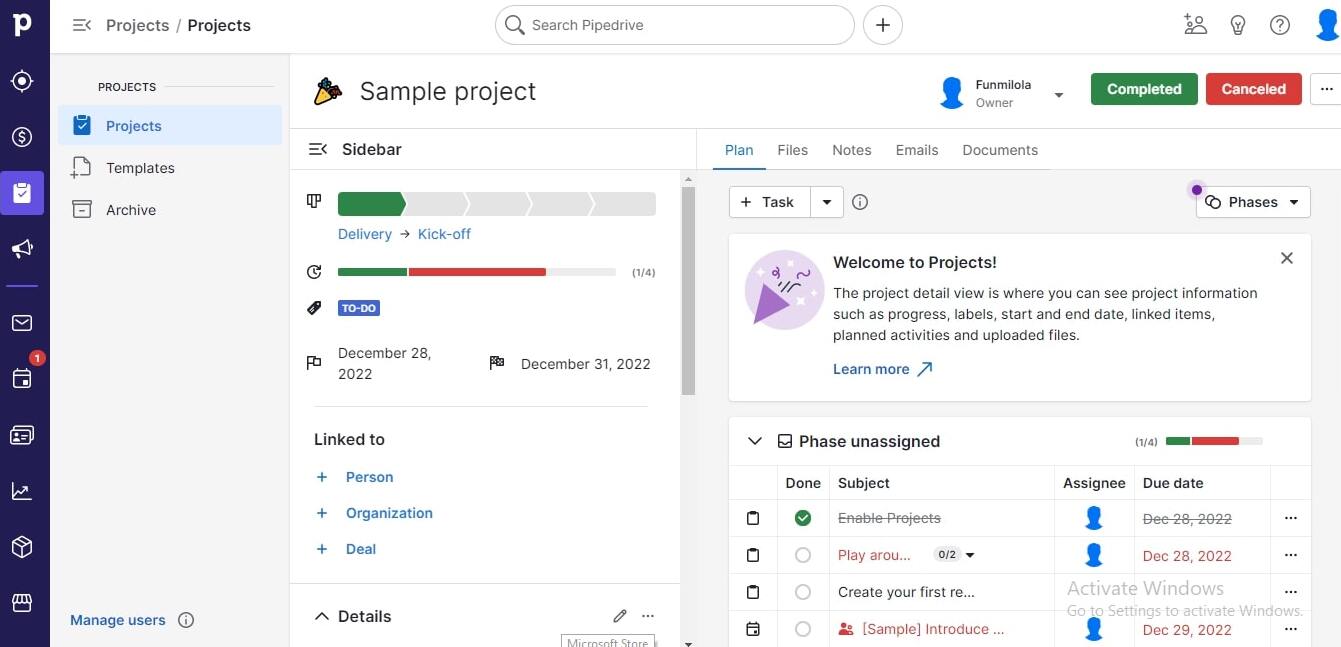
Key Features
- Visual sales pipelines – Drag-and-drop interface makes it easy to manage leads and deals.
- Activity tracking – Schedule calls, emails, and follow-ups directly from the platform.
- Custom fields and filters – Tailor your CRM to fit your retail sales process.
- Lead segmentation – Group and prioritize customers based on behavior, size, or status.
- Email integration – Send, receive, and track emails without leaving the CRM.
- Sales reporting – Clear dashboards show performance, conversion rates, and deal health.
Pros and Cons
Pros
- Incredibly easy to use and set up
- Streamlined for sales-focused workflows
- Visual pipeline is intuitive and effective
- Good email tracking and communication tools
- Affordable pricing tiers
Cons
- Not built for marketing or full-service CRM needs
- Limited automation unless you’re on higher tiers
- Missing advanced features like multichannel outreach or support tools
Who It’s For
Pipedrive is a solid choice for retail businesses with sales-driven teams that want a simple, efficient way to manage leads and close deals. If you’re not looking for a full-scale marketing platform and just need a clean, focused CRM to support your sales process — Pipedrive keeps it tight and effective.
HubSpot CRM: Best for automating customer outreach


HubSpot CRM offers a clean, user-friendly platform with powerful automation and marketing features baked right in. It’s ideal for retail businesses that want to streamline customer communication, nurture leads, and keep marketing and sales aligned — all without needing a developer to set things up. Bonus: the free plan is actually useful.
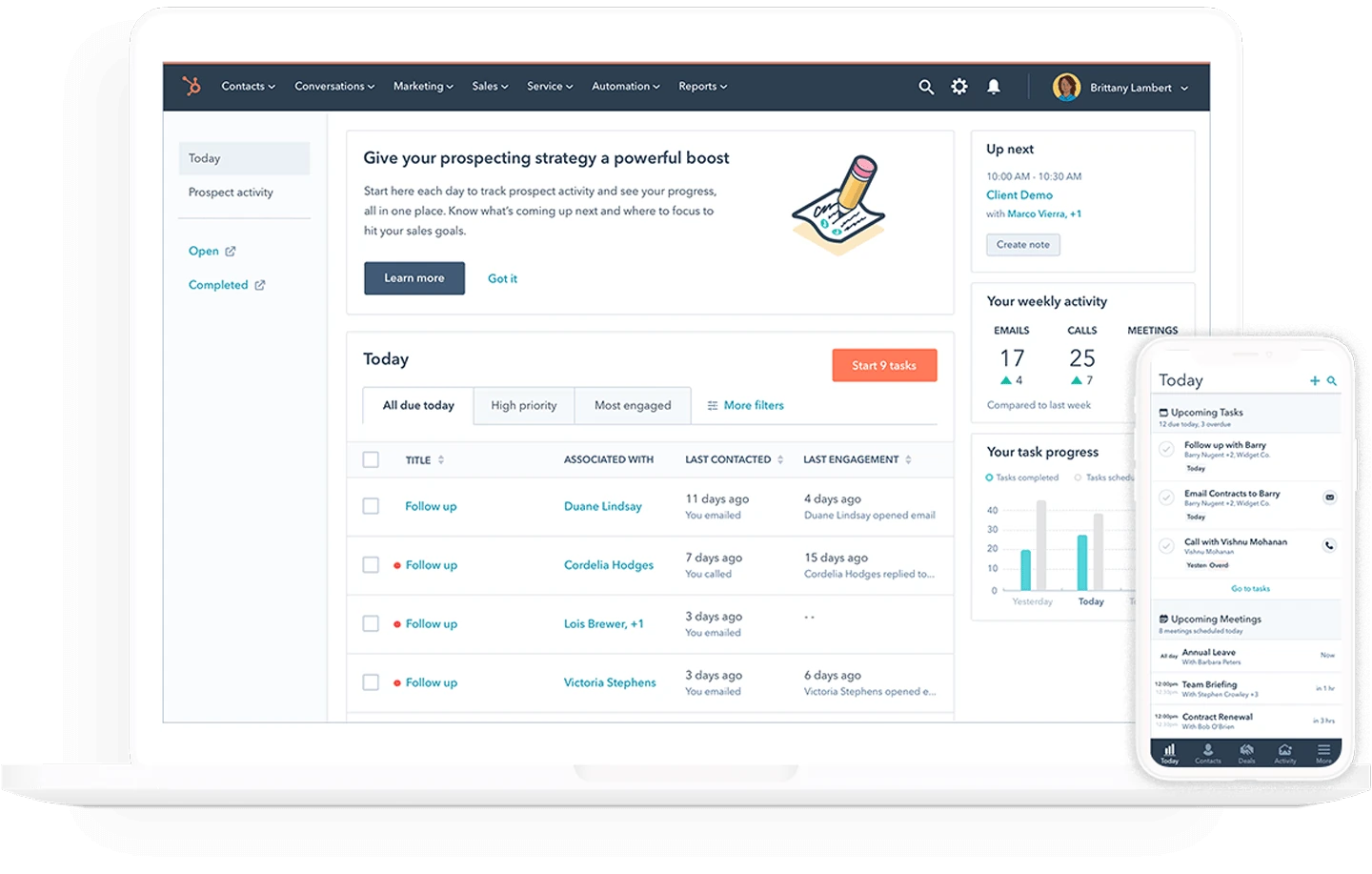
Key Features
- Contact and lead management – Store customer info, track activity, and manage interactions in one place.
- Email marketing tools – Build and automate campaigns with segmentation and personalization.
- Live chat and chatbot options – Engage visitors on your site in real time.
- Sales pipeline tracking – Visual dashboards to manage and monitor deals.
- Automation workflows – Trigger follow-ups, emails, and internal actions based on customer behavior.
- App integrations – Connects with Shopify, Gmail, Facebook Ads, and more.
Pros and Cons
Pros
- Excellent free plan with real functionality
- Built-in email marketing and automation
- Easy to set up and scale
- Great for combining sales and marketing
- Clean, intuitive interface
Cons
- Advanced features locked behind higher tiers
- May be too marketing-focused for sales-only teams
- Can get pricey as you expand
Who It’s For
HubSpot CRM is perfect for retail businesses that want to automate customer communication and combine sales with marketing in one platform. If you’re looking to send targeted emails, track interactions, and grow your customer base without overcomplicating things, HubSpot makes it easy — especially if you’re starting with a smaller team.
Related Articles
Why a Great CRM Matters for Your Retail Business
Customers don’t just want to buy — they want to be remembered. And if you’re running a retail business, juggling customer data, orders, preferences, and communication without a CRM for retail, balls will drop.
A great CRM retail system gives you structure, clarity, and a serious edge. Here’s what it helps you do:
- Track customer behavior – See what people are buying, how often, and what keeps them coming back.
- Personalize marketing – Send the right message to the right customer at the right time.
- Streamline sales – Keep leads, deals, and follow-ups organized and visible.
- Improve retention – Build real relationships instead of letting customers slip through the cracks.
- Make smarter decisions – Use real-time data to spot trends and adjust fast.
Retail is fast-paced — your CRM should keep up. When it’s set up right, it becomes your quiet powerhouse in the background, helping you sell more, connect better, and grow with confidence.
Things to Consider When Choosing a CRM for Your Retail Business
Not all CRMs are built the same — and not all of them are built for retail. Before you make your choice, here’s what to think about to avoid wasting time (and budget):
- Ease of use – Your team actually has to use it. If it takes a manual to add a contact, that’s a problem.
- Retail-specific features – Look for tools like purchase tracking, customer segmentation, inventory visibility, or loyalty program support.
- Automation capabilities – Can it handle follow-ups, reminders, and routine tasks without someone babysitting it?
- Integration options – Make sure it plays nice with what you already use — POS systems, email platforms, eComm tools, etc.
- Customization – Every retail business runs differently. Can you tweak workflows and dashboards to match your setup?
- Scalability – Will it still work when your customer list doubles or you open a second (or third) store?
- Support and onboarding: Some CRMs are easy to use out of the box, while others require a week and a consultant. Know what you’re getting into.
Bottom line: choose a CRM that fits your retail business, not the other way around.
What CRM Features Matter Most For Your Business?
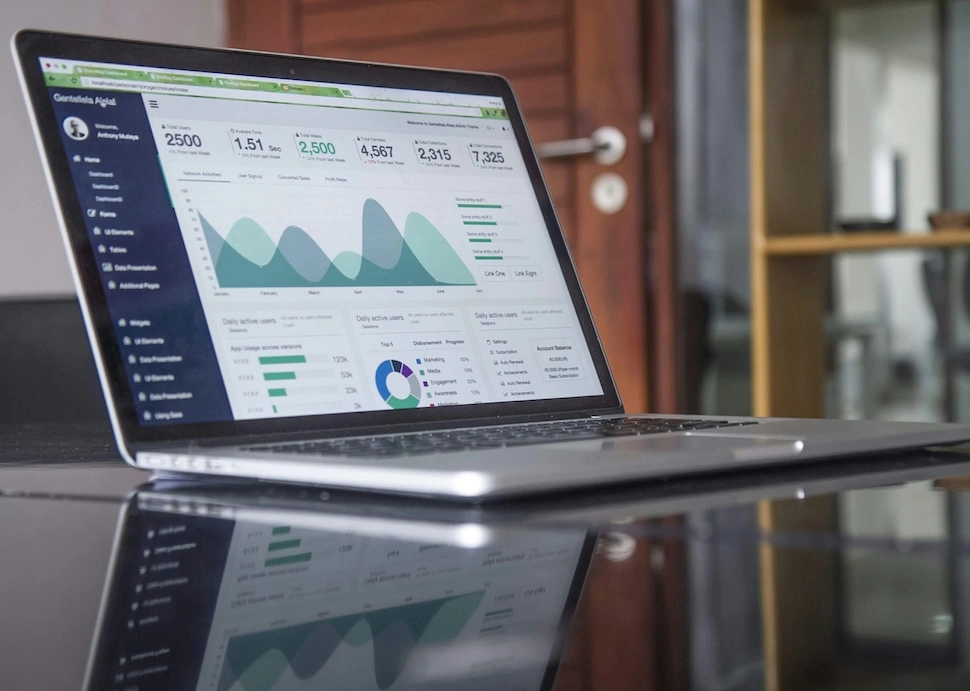
The right CRM for retail depends on the kind of business you’re running. Here’s how features shift depending on what you sell and how you operate:
- Brick-and-mortar stores
Need features like customer profiles, loyalty tracking, and local campaign tools.
Example: A boutique clothing store using Zoho CRM to track in-store purchases and send custom offers to frequent shoppers.
- Online-only retailers
Should look for integrations with eCommerce platforms, cart abandonment tracking, and automated email campaigns.
Example: A fashion brand using HubSpot CRM to segment customers based on purchase history and trigger personalized email campaigns through its WooCommerce store.
- Multi-location retailers
Need centralized dashboards, location-specific reporting, and tools for managing customer interactions across stores.
Example: A national footwear brand using Salesforce to oversee sales performance across 10 stores while keeping customer data unified.
- High-ticket or specialty retailers
Benefit from lead scoring, appointment scheduling, and personalized follow-ups.
Example: A luxury watch shop using HubSpot CRM to manage client outreach and book in-store consultations.
- Retailers with field sales reps
Need mobile access, pipeline visibility, and territory management.
Example: A home appliance brand using Pipedrive for reps to update deals and customer notes while on the road.
- Subscription-based retailers
Look for automation, renewal reminders, and customer lifecycle tracking.
Example: A monthly pet supply box brand using ClickUp to manage subscription statuses, customer notes, and support tickets.
Different retail models = different priorities. The right CRM meets you where you are and scales with where you’re going.
The Bottom Line
The right retail CRM can streamline your operations, boost sales, and help you build stronger customer relationships.
Still not sure what you need? Sonary can help you choose the CRM that actually fits your business.
FAQ
Q: What is a CRM for retail stores?
A: A CRM for retail is software that helps businesses manage customer relationships, track sales, and organize marketing efforts. It centralizes data so you can understand buying behavior, personalize outreach, and drive repeat business.
Q: Why do retail businesses need CRM software?
A: Retail CRM solutions help you stay organized, automate customer communication, and make smarter decisions based on real data. It improves customer retention, increases sales efficiency, and saves your team time.
Q: What’s the best CRM for small retail businesses?
A: Tools like Zoho CRM and Pipedrive are great options for small retail businesses because they offer affordable plans, automation features, and simple interfaces.
Q: Can a CRM system integrate with my POS or eCommerce platform?
A: Yes — many CRM retail systems integrate with platforms like Shopify, Square, and others, allowing you to sync sales data, customer history, and inventory in real-time.
Q: How is a retail CRM different from a general CRM?
A: A retail CRM often includes features tailored to customer-facing businesses, such as purchase history tracking, loyalty management, targeted promotions, and retail-focused reporting.
Q: Is there a free CRM for retail businesses?
A: Yes. HubSpot CRM, Zoho CRM, and ClickUp all offer free plans that include core features. Just note that you may need to upgrade for advanced tools like automation or integrations.
Q: Can a CRM help with customer retention?
A: Absolutely. A great CRM in retail helps you stay in touch with customers, send personalized offers, and follow up at the right time — all of which increase loyalty and repeat business.
Q: What should I look for in a CRM for my retail business?
A: Look for features like contact management, automation, integrations with your existing tools, customizable workflows, and reporting. The best CRM for retail fits your business model and is easy for your team to use.






